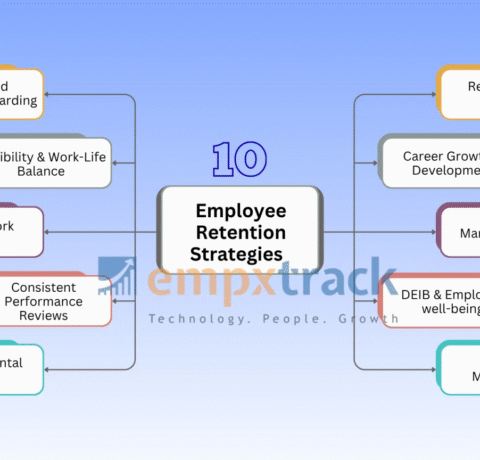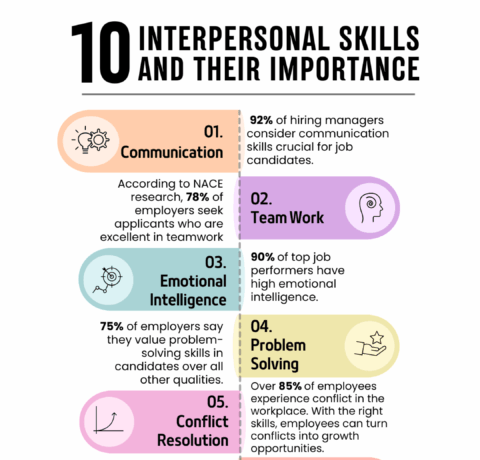10 Core Principles of Entrepreneurship Infographic
What skills do you need to be a successful entrepreneur? The 10 Core Principles of Entrepreneurship Infographic presents10 things you can start working on now!
1. Know Thyself
Your startup is an embodiment of your whole and a reflection of your beliefs. Prior to creating a startup, it’s important that you know yourself well; understand your strengths, weaknesses, and find out about your blind spots. Find your passion, search for ideas that set your imagination soaring. You must learn to capitalize on your strengths and continue learning new skills which will be relevant to your prospective venture. Surround yourself with people that will give you a true picture of things. Blind spots created by lack of self-awareness hurt your performance and prevent you from getting to the next level. Once you become aware of different facets of your own personality, you will become a much more effective leader. Being a good listener and having emotional stability goes a long way in achieving this.
2. Choose the Right Business
As an entrepreneur you will be investing years of your life building your venture. So it helps to know that not all industries are created equal; some are more profitable than others, some are hyper competitive while some offer a sustainable advantage. Make sure you allocate your energy, time and resources to a business which is likely to generate good returns. It’s advisable to do a lot of research, gather facts and talk to experts before you make a move. Have clarity with respect to the competition, understand the market size and the share you can acquire over time. Understand the profit potential of your business before taking the plunge.
3. You Are Only as Good as the People Around You
Although your venture is an embodiment of your idea, but it is the people who eventually run and sustain it. Business is like sports, the best teams usually win. You should not only focus on hiring the right person for the right job but also give them room to grow in order to retain them. Providing high-frequency feedback is essential for making continuous performance improvements. If you internally lack a specific expertise, hire external consultants to fill the gap. Make a map of the people around you (both within and outside the company such as customers, suppliers, and other third parties), review it frequently and identify the parts that need a stronger link. Remember, it is all about people, people and you guessed it right, people.
4. Build a Winning Culture
A lot of aspiring entrepreneurs underestimate the benefits of building the right organizational culture. This is a mistake which can have dire consequences. The DC2RS approach consists of five steps to create and sustain the right culture. Define-Communicate-Reinforce-Repeat-Shape. It is a human need to figure out how to behave and interact with others in an organization. Therefore it’s wiser to define your organization culture, make it explicit and constantly reinforce it by repeating the same consistent message. If you don’t, culture can morph into behaviors that are damaging and undesirable. Culture is a living organism that requires constant monitoring and shaping. Once you come to this realization and start managing expectations, you will discover a formidable lever to inspire and motivate your team to achieving goals that may initially have been perceived as impossible.
5. Define the Key Metric That Matters the Most
Hard work diluted over multiple directions is not likely to yield great results. Energy and resources need to be channeled in the right direction to maximize the odds of success. To win, an organization must define the game it wants to play and specify the right ways to measure performance. Although multiple performance indicators need to be tracked; it’s imperative to choose one primary metric to enable the entire organization to focus on one dimension of performance. This metric can be updated as the organization moves through different stages of its maturity cycle. For example a retail start-up might initially focus more on growing the number of stores, then grow revenues, and then shift to maximizing profits. As another example Facebook’s primary metric is the number of its active monthly users.
6. Accurately Assess Capital Requirements
The reason for why companies go bankrupt is because they run out of cash. A lot of businesses make optimistic financial assumptions before starting their venture. However, it is wise to accurately assess how much capital will be required by running multiple scenarios including a pessimistic and very pessimistic one. The key is to assess capital requirements as realistically as possible. By nature some businesses are more capital intensive than others, so know what type of business you’re getting into. If you want to get investors, understand the risk of losing the money and how it may affect your future relationship. If you raise money from friends and family, be realistic about how you communicate risks, and understand the implications it can have on the relationship if you don’t deliver the numbers in your plan.
7. Use the Right Incentives
Incentives are a great mechanism to encourage particular behaviors and align goals between stakeholders. However, every incentive comes with a downside. There is no perfect incentive scheme; you need to aim for the right balance based on the behaviors you would like to encourage. To complicate matters different people are motivated by different incentives. Incentives can be monetary as well as non-monetary; they can be in the form of recognition, authority, conducive work environment etc. It’s really important to use them wisely as incentives can create or destroy value. For example, if you provide sales people with a commission on sales, they might increase discounts to get more contracts or sell products regardless of their gross margin; which in turn might hurt your profitability. So before you put an incentive scheme in place think of all the possible often unforeseen downsides it can generate, and make sure the positives are greater than the potential negatives. If unsure, introduce your plan for a limited period of time to assess results.
8. Have Deep Empathy
In today’s world where customers are more empowered more than ever, you can’t build a profitable and sustainable business unless you can empathize with the people you interact with. Understand the world as it is, and not according to how you would like it to be. Listen to people, understand your customers by putting yourself in their shoes. Every entrepreneur provides solutions to an existing problem/need in the industry. The ability to empathize with others not just makes you a better person but also better at business.
9. Experiment in Stages
Experimentation and adaptation are two incredible tools to forge an innovative enterprise. The following four steps will enable you to experiment successfully as well as profitably:
- Experiment: Come up with a hypothesis which will differentiate you from competitors and add value to your customers.
- Learn: Understand the impact of your hypothesis and evaluate it objectively.
- Adjust: Refine your hypothesis based on the learning.
Scale: Grow what works, and prune out what doesn’t.
10. What Next?
A successful entrepreneur has his or her feet on the ground and his or her eyes on the future. Every morning when you get to work, think about where to make improvements based on where you are in the contextual present. Ensure that you make the right decisions along the way while keeping in mind your long-term vision. Write a journal to introspect and gain perspective on how you are progressing and dealing with the challenges you face. Build an advisory board to provide you with additional external perspective. Also regularly think of your exit strategy. Do you plan to sell the company, pass it on to next generation or go public? Thinking about exit options forces to evaluate your company, and as such figure how to increase its value. Remember the first step in creating the future is anticipating it.
Entrepreneurship is beautiful. “In life it’s better to have tried achieving your dreams, even if you fail, rather than regret not having tried at all. You will always get richer in experience.”
Stay hungry, be courageous and keep on making wise decisions.







You can adjust your cookie preferences here.